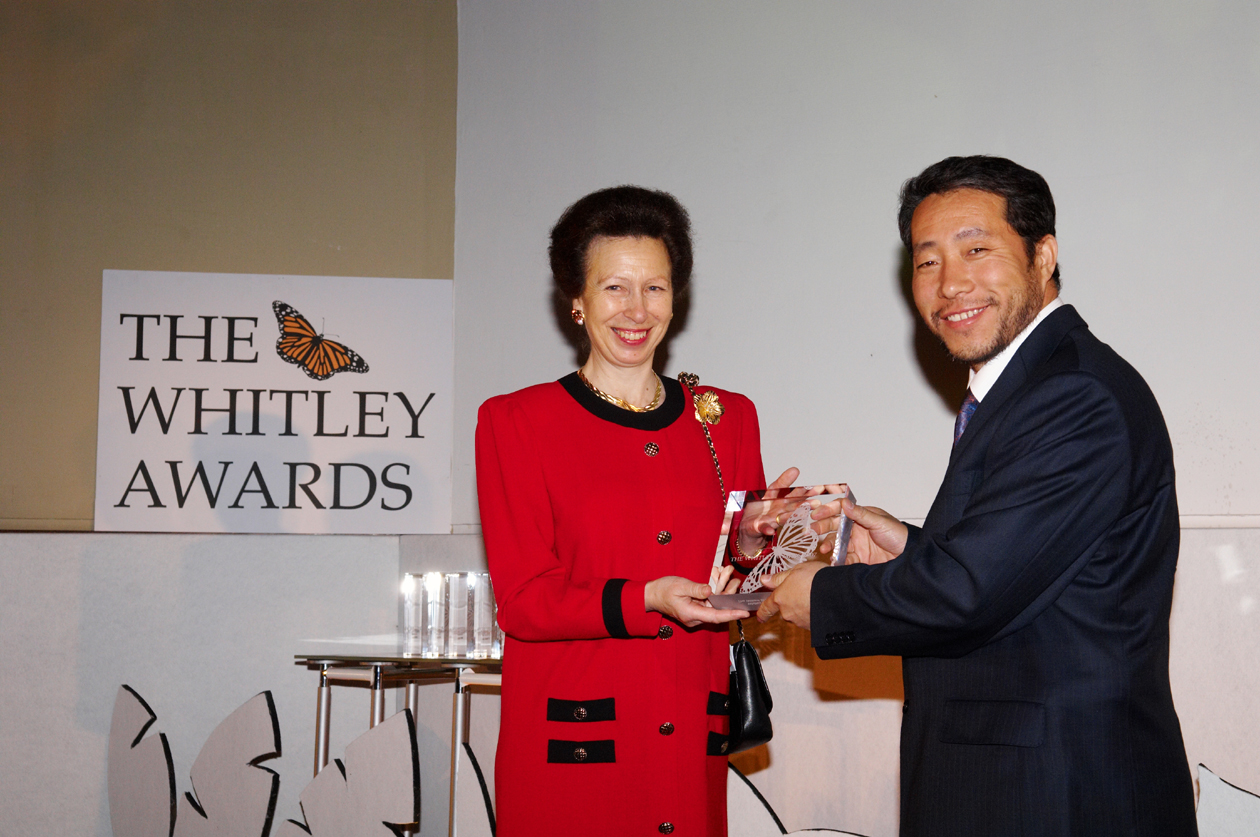由于在白头鹤中研究中取得的突出成果,5月10,郭玉民博士获得了英国环保领域的最高奖——2007年Whitley Award!英王室安妮公主为郭玉民博士颁发了奖牌。

Chinese
ornithologist Guo Yu Min has won the UK's top conservation prize, the Whitley
Award, for his research into one of the most secretive birds in the world, the
Hooded Crane.
Yu
min received The Whitley Award donated by The William Brake Charitable Trust from
HRH The Princess Royal and Sir David Attenborough at a ceremony at London's Royal
Geographical Society last night. It is only the second time someone from China
has won the Award.
A
threatened species, the Hooded Crane is one of least known large birds in the
world partly because of the inaccessibility of its habitat and its naturally secretive
behaviour. Only 60 breeding pairs have been recorded worldwide. The forest swamps
of the Xing'an Mountains, near the border with Russia, are the last stronghold
for Hooded Crane in China. Until now the Hooded Crane has been more secure than
the other East Asian cranes as there has not been much human activity in or around
their breeding grounds. It has been hard to assess its status or to develop sensible
conservation measures in its remote habitat.
Now,
however, they face the threat of wetlands drainage for agriculture. Alterations
in the great river areas (the three Gorges dam and conversion to agriculture)
make the bird's future less secure. As the rapid advance of hydropower projects
claims one mountain river valley after another in the Russian Far East, the cranes'
breeding areas are disappearing.
The
isolation of the area has meant the bird did not receive much attention from Russian
scientists and the threats to its habitat went unrecognised. Now the planned hydropower
plants will affect at least half the known breeding range and it is possible the
Hooded Crane will fall victim to large-scale development even before it becomes
well-known to the world.
Chinese ornithologist Guo Yumin, who has been described as "as secretive and shy
as his crane", has been working in the Xing'an Mountains since the late 1990s
monitoring the secretive bird species, its nest building and chick rearing habits
and the human impacts on its breeding habitat. Five years ago when he started
to work alongside Russian conservationists he realised that no systematic research
had been carried out worldwide. In the last two years he has visited many of the
Russian Far East provinces, building up relationships with ornithologists and
nature reserve managers and establishing cooperation across the Russian-Chinese
border where, historically, conservation has not been of major importance.
Yumin
has worked to change this, and has built up a team of Chinese and Russian ornithologists
who are working to conserve the hooded Crane and the larch forest swamps where
it breeds. He is also working closely with local people to change attitudes towards
wetlands as important places for both birds and people.
Since
1994 the Whitley Awards have been awarded annually. They are worth up to £30,000
each and are one of the largest nature conservation awards available, recognizing
outstanding efforts by leading local conservationists whose work is based on sound
science and which fully involves local communities.
Edward
Whitley, Founder and Chairman of the Whitley Fund for Nature said: "The hooded
crane is in need of a concerted conservation effort. By forging links with Russian
ornithologists as well as addressing the shortfall in our knowledge about this
bird, Guo proves himself an ideal Whitley Award winner. He is covering new ground
and learning what we need to know to conserve cranes and their endangered habitat".

